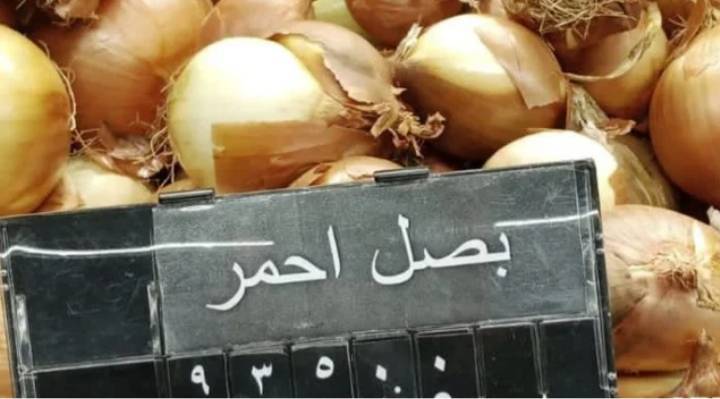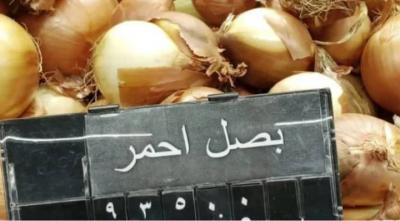With every price difference and each increase in the exchange rate, the dollar goes wild, causing the prices of goods to rise slowly until they become astronomical and unaffordable, just like the prices of onions. In some places, a kilogram of onions is sold for 100,000 L.L. Is there any justification for this? When will this crisis be resolved?
Recently, onions have joined the list of goods that the markets are struggling with, forcing traders to raise their prices in Lebanon. This has led many low-income families to forgo onions or reduce the quantity used in cooking because their prices have sadly become competitive with meat and cheese. Many people are currently preoccupied with the subject of onions, a type of vegetable that previously never crossed our minds due to its constant availability and low price. You can find it in the homes of both the poor and the rich, especially since it is a fundamental flavoring in Lebanese dishes, such as mulukhiyah with rice, pea with rice, mujaddara, meat seasoning, and even chicken. Onions are welcomed in almost all dishes, including pizza, burgers, and appetizers. So, will they be dispensed with?
Global Onion Production Declines...
Due to reduced onion production in the top two exporting countries in the world, India and Pakistan, as a result of floods that caused significant damage to onion crops, the onion crisis has taken on a global aspect, especially following its insane price hikes. The crisis began in the Philippines, where about ten flight attendants were suspended for smuggling bags of onions, and it has escalated to this day. In Pakistan, a previous report mentioned that onions are sold for 250 rupees per kilogram, while prices range from 200 to 320 rupees in other parts of the country due to limited access to crops and additional taxes on importing basic food items starting January 1. Reports suggest that the crisis will continue.
In light of this reality, media outlets and social media engaged with the rising prices of onions. Media in Lebanon buzzed with reports of the price of a kilogram of onions reaching 95,000 L.L. following the depreciation of the lira's exchange rate in the parallel market. Many times, social media in Lebanon has been filled with jokes and humor, including one young man who proposed to his girlfriend with a diamond ring—oops, I mean an onion peel ring, claiming it was high-quality jewelry, expensive and priced in dollars.
We are in a holy fasting period, and we don’t know what to eat. We cannot cook meat and chicken or even consume dairy products, including milk and cheese. All we can think about are "oil-based" dishes, and all of these require their basic ingredient: onions. So how will we buy onions when the price is 80 and 90 thousand L.L. per kilogram?
Nesrin asked these questions, considering that there is no power or strength in this country where life has become extremely difficult. She said: "A kilogram of lentils is 180,000 L.L. and onions are 80,000 L.L. As for rice, a kilogram costs 2 dollars, equivalent to 200,000 L.L. Can you imagine that a poor person's meal, which is mujaddara, now costs nearly 500,000 L.L.? Truly, the food is threatened, and we do not know what to do about this issue, especially in Beirut because life there is endangered."
Will Onions Flourish Soon in Lebanon?
In a conversation, the head of the Farmers' Union, Ibrahim Al-Tarshishi, confirmed that we do not export onions abroad, and this is not true, as the minister has banned exports except under a license that is currently not issued to anyone. He continued: "The price of onions has risen globally due to the heavy rains that fell in India. The losses in Lebanon accumulated from 2020 to 2021 until now because onion farming at that time was very limited. After all these problems, the price of onions skyrocketed globally from 200 dollars to 400 and 500 dollars. Egypt was our closest option for importing onions, where at that time, a ton was priced at 100 to 200 dollars.
In 2023, a ton of onions now arrives at the Port of Beirut for 550 dollars. He states: "Every time the dollar price increases, the price of onions will also rise because it is entirely linked to the dollar price. Today, the dollar has certainly monopolized all prices, rising from 82,000 L.L. to 87,000 L.L. and even further. Therefore, vegetable traders 'don't know what to do' and what they should sell and what they should buy."
Al-Tarshishi added: "There is no stability in the country, and there are no standards for any commodity or price due to the instability of the dollar price. At the very least, it should stabilize for a few days so that we know how to operate and how to price items. The dollar is going crazy daily, causing citizens to lose 5% to 10% of their income and the value of their money. Today we have the onion crisis, and tomorrow it will be the potato crisis. All vegetables that we need to import from abroad are naturally priced in dollars. The good news we can share is that, God willing, starting from April 15, we will begin the onion season in Lebanese territory, which means that after a month and a half, onion prices should improve, and production will flourish in Akkar."
Regarding the reason for the price increase in Beirut compared to its prices in Baalbek, Al-Tarshishi confirms that in Beirut, prices are "retail" in malls and large, luxurious shops, while in the vegetable market in Farzoul in Baalbek and the vegetable market in Beirut, the prices of onions remain the same or differ slightly due to transport costs; the price per kilogram varies by a thousand to two thousand L.L. Therefore, despite the rise in the dollar price, onions should be sold at a maximum of 50,000 L.L. The local onion is of better quality and more reasonably priced than the imported onion, and even its color is more appealing. The local Lebanese onion is cheaper than the imported; the national price is 45,000 L.L., while the imported price is 50,000 L.L. (This is talking about wholesale in the vegetable market).




